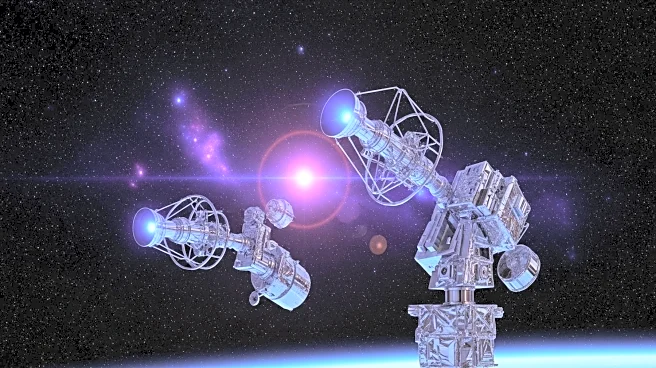What's Happening?
NASA's Cosmic Origins (COR) Program is actively seeking information to develop future ultraviolet (UV) and visible wavelength astrophysics missions. This initiative is part of NASA's broader effort to understand cosmic origins through advanced space missions. The program recently issued a Request for Information (RFI) to gather insights on potential science investigations that could shape the next generation of UV/Visible space missions. The RFI, which closed on August 10, 2012, received 34 responses from the scientific community. These submissions are intended to help NASA establish cohesive science goals and technological requirements for upcoming missions. A workshop is scheduled at the Space Telescope Science Institute to discuss these responses and further refine the mission concepts.
Why It's Important?
The development of new UV/Visible astrophysics missions is crucial for advancing our understanding of the universe. These missions aim to explore fundamental questions about the formation and evolution of galaxies, stars, and planetary systems. By focusing on UV and visible wavelengths, NASA can gather unique data that is not accessible through other means. This research has the potential to uncover new insights into the cosmic origins and the role of dark matter and energy in the universe. The outcomes of these missions could significantly impact astrophysics, providing valuable data for scientists and researchers worldwide.
What's Next?
Following the RFI submissions, NASA plans to hold a community workshop to discuss the responses and work towards defining the science drivers for future missions. This collaborative effort will involve scientists and experts from various fields to ensure that the mission concepts are well-rounded and address key scientific questions. The workshop will be a platform for further refining the mission objectives and technological requirements, paving the way for the next steps in mission planning and development.
Beyond the Headlines
The initiative highlights the importance of community involvement in shaping NASA's scientific agenda. By soliciting input from a wide range of experts, NASA ensures that its missions are aligned with the latest scientific priorities and technological advancements. This collaborative approach not only enhances the quality of the missions but also fosters innovation and knowledge sharing within the scientific community.









